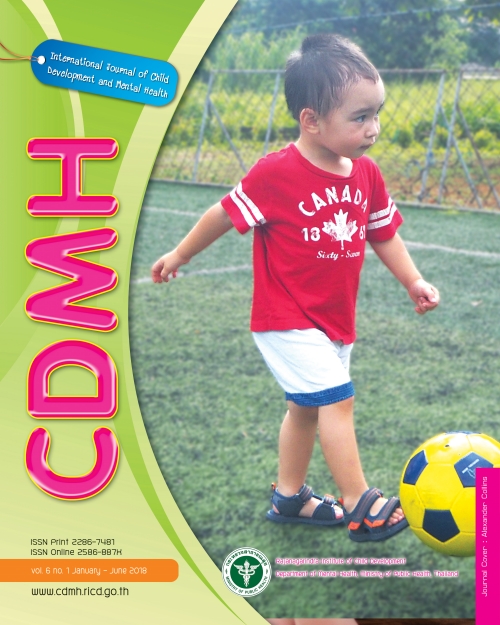The Development and Effectiveness of an Integrative Cognitive Rehabilitation Program for Persons with Schizophrenia
Main Article Content
Abstract
This research and development study aimed to develop and test the effectiveness of an integrative cognitive rehabilitation program for persons with schizophrenia. The study consisted of four main steps. The first step was situation analysis of cognitive impairment and treatment for persons with schizophrenia. Relevant documents and focus group interviews with schizophrenic patients, caregivers, healthcare providers and experts were collected for the content analysis. These findings were used to establish a first draft program in the second step. Content validity was tested, with an Index of Item-Objective Congruence of 0.77. The second draft program was developed by adjusting the first draft, and then was pilot tested and adjusted again to become the third draft. In the third step, the third draft was tested for its effectiveness on cognition, attention, memory, executive functions, and personal and social performance in 32 persons with schizophrenia. Outcome measures were the Montreal Cognitive Assessment, the Attention Assessments, Thai Cognitive-Perceptual Test, the Loewenstien Occupational Therapy Cognitive Assessment, and the Personal and Social Performance Scale -Thai version. Data were analyzed using descriptive statistics, two-way ANOVA, paired t-test, Kruskal-Wallis, Dunn’s test, and two-way repeated measures ANOVA. The last step involved evaluation of the third draft after effectiveness testing, and program adjustment for the final program. The program comprised 15 daily, 60-minute group sessions. The experimental group had significantly higher post-intervention scores of cognition, auditory memory, and executive functions from the baseline; and had significantly higher executive functions than the control group. The experimental group had significantly higher scores of personal and social performance from the baseline to weeks 4 and 12 follow-up; and higher than the control group at weeks 4 and 12.The findings support the utility of a program in cognitive rehabilitation and relapse prevention for persons with schizophrenia.
Article Details
![]()
Creative Commons License
This work is licensed under a Creative Commons Attribution-NonCommercial-No Derivatives 4.0 International (CC BY-NC-ND 4.0)
The authors retain copyright and permit the journal the copyright of first publication
Articles, once having passed the review process and accepted for publication in the CDMH Journal, are copyrighted under the CDMH Journal, Department of Mental Health, Ministry of Public Health. Please be aware distribution of CDMH Journal content for commercial purposes without permission is expressly prohibited. However, distribution with intent to educate, advocate, or spread awareness within the general public and research communities is permitted and encouraged with the understanding that the CDMH Journal Editorial Board do not hold jurisdiction or liability for any accompanying comments, text, or information from third parties, either in favor for or against the original article’s assertions, conclusions, methodology, or content.


